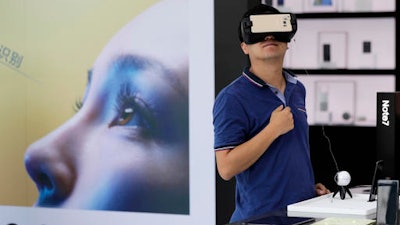
SEOUL, South Korea (AP) — Samsung Electronics said Monday that its investigation into the first report of a Galaxy Note 7 fire in China found no battery problem, reducing concerns that its smartphone crisis had expanded to the world's largest mobile phone market.
The South Korean tech giant said it was not able to investigate a second reported fire because it could not obtain that phone.
The two accounts of Galaxy Note 7 fires appeared on Chinese social media and were widely reported by Chinese and South Korean media, raising alarms because the South Korean tech giant earlier said no Note 7 recall was necessary in China because the phones sold there did not have the battery manufacturing error that caused fires in dozens of phones sold in other countries.
Samsung announced the global recall of 2.5 million of its flagship smartphones just two weeks after they were launched.
It is struggling to restore consumer trust after 92 reports of Note 7 batteries that overheated or caught fire in the United States, which prompted an official government recall there last week. The company began shipping new Note 7 phones to replace the defective ones this week in South Korea.
The Chinese battery supplier for Note 7 phones sold in China said Monday the fires there appeared to be different from those in other countries.
"We believe the heat problem comes from outside the battery. A very large likelihood exists that other factors gave rise to the heat problem," Amperex Technology Ltd. said. It gave no indication of what may have caused the problems.
Samsung said its investigation suggested external heat had damaged the phone. South Korea's Yonhap News Agency and other South Korean media said it may have been an effort by consumers to tarnish Samsung.
Samsung said it tried to obtain the phone involved in the second reported fire, but was not able to, correcting its earlier statement that it was investigating both cases.
The Galaxy Note 7 recall has been Samsung Electronics' biggest crisis in recent years. Samsung has faced criticism that it failed to coordinate with government safety regulators and did not give clear information to consumers. Many airlines have banned use of the Note 7, saying it is a flight hazard.
In its initial announcement on Sept. 2, Samsung did not say whether consumers could continue to use the phones without danger. A few days later, it urged them to immediately turn off the phones. And last week, Samsung said it is rolling out a software update to the Note 7 phones that will limit the battery charge to 60 percent but didn't say whether all phones would automatically receive it.
In South Korea, mobile carriers said Note 7 owners could begin exchanging their phones starting Monday, but there were few people doing so at a Samsung service center.
South Korea's government has not issued an official recall like its counterparts in the U.S. and Canada. Monday is the deadline for consumers in South Korea to get a full refund.
The Note 7 debuted to rave reviews in August thanks to its speed, new software features and longer time between charges, which requires a more powerful battery. But shortly after the launch, users began to report fires or explosions, in one case causing a blaze that destroyed an SUV.
In the first incident reported in China, a social media user posted messages Sunday saying a friend's Galaxy Note 7 caught fire over the weekend. It included photos of the damaged phone.
The user, contacted by phone, told The Associated Press the Note 7 was bought Sept. 1 through the JD.com e-commerce site. The man, who asked not to be identified by name, said the phone started to heat up and vibrate late Saturday night, then exploded and emitted black smoke.
A second report on a separate social media account said an owner's phone exploded Sunday while the person was playing a game on it. That account gave no contact information for the user or details of where the person lives but showed photos of the damaged phone and its serial number.
The incidents could set back Samsung's effort to stage a comeback in China, where it has slipped to No. 6 in a crowded market behind ambitious local brands, said Nicole Peng of research firm Canalys.
Samsung accounted for 8 percent of smartphone sales in China in the three months ending June 30, down slightly from the previous quarter's 9 percent, according to Canalys. Huawei was in first place in both quarters with 16 percent, followed by Vivo and Xiaomi at 13 percent.
"This will make it difficult to make it back to the top," Peng said.
Samsung Electronics launched the Note 7 phone in China on Sept. 1, after reports began spreading of the phones catching fire in other nations.
Samsung's mobile president, Koh Dong-jin, said at the time that sales in China would continue because Note 7 phones sold there use different batteries.
Analysts believe Samsung SDI supplied most of the faulty batteries while Note 7 phones in China use batteries made by Amperex, which reportedly also is a main supplier of batteries for Apple's iPhone.
Last week, Samsung recalled 1,858 Note 7 phones in China from a different batch that had been distributed before general sales began. The company said the two units involved in the reported fires were not from that batch.






















